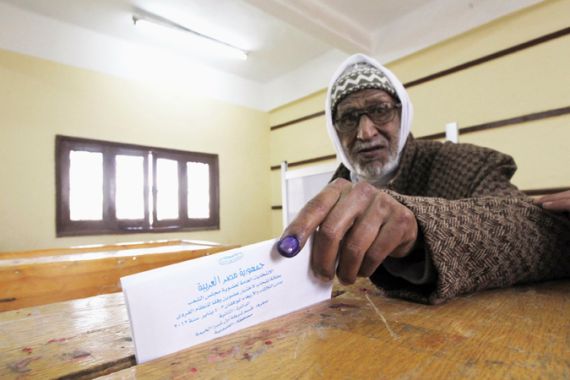Egypt enters final day of voting
As election for lower house of parliament continues, Islamists pledge to work with rivals on writing new constitution.

| Al Jazeera’s Mike Hanna reports from the Egyptian capital, Cairo |
Egyptians took to the polls for a second day in the final stage of the election for the lower house of parliament, the first free legislative vote since military officers overthrew the monarchy in 1952.
Voting takes place over two days – Tuesday and Wednesday – in the Nile Delta provinces of Qaliubiya, Gharbiya and Daqahliya, the New Valley province, the southern governorates of Minya and Qena, the border province of Matruh, and in North and South Sinai.
Up to 15 million people were eligible to cast their votes in the final round for the first parliament since an uprising toppled long-time president Hosni Mubarak in February last year.
Islamist groups came late to the uprising, but have so far won the biggest share of seats in the previous rounds of the first free and fair elections in six decades.
However, the Muslim Brotherhood has said it will not use its electoral success to impose its will on the drafting of a new constitution and will work with all rival political groups on the blueprint.
“This new parliament does not have the mandate to choose a new government, but rather to choose an assembly to write the constitution,” Al Jazeera’s Sherine Tadros, reporting from El Arish in the Sinai Peninsula, said.
Real battle
She said forming the assembly to write a new constitution is where the real battle will lie. It will be less about the coalition parties in the new parliament, but “more about the ideas they have for the identity of the new Egypt”.
These elections also bring hope to the bedouins in the Sinai Peninsula, a sector of society who have felt consistently marginalised and ignored under Hosni Mubarak’s government.
“We have had a lot of problems in the Sinai, and with this revolution we dream of having a new Sinai,” Hamdy Al Azzazy, a human rights activist, told Al Jazeera. “The old government neglected the bedouins and the people from the Sinai for a long time, and we demand the right to work and to hold positions in the army and the government.”
“We need the new parliament to see us as equal to the people from Cairo,” he said.
Western concern and Israel
The success of the Muslim Brotherhood’s Freedom and Justice Party (FJP) and other Islamist parties has prompted Western concern for the future of Egypt’s close ties to the US and peace with Israel.
“The party’s winning of the majority in the new parliament does not mean going it alone in writing the constitution without consideration for the rights of other Egyptians, or ignoring the political forces which did not get a majority or failed in the parliamentary elections,” Mohamed Mursi, the FJP head, said.
“All political forces and intellectuals in Egypt, regardless of their political and religious allegiances, will take part in writing the constitution.”
Mursi’s comments were published on the Muslim Brotherhood’s website on Tuesday.
The run-up to this round of polls has been overshadowed by the deaths of 17 people last month in clashes between the army and protesters demanding the ruling military step aside immediately.
But the military generals have insisted the election process will not be derailed by violence.